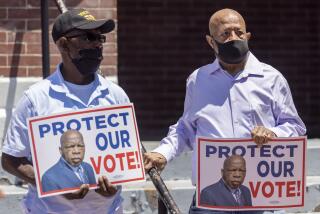In Push for Bosnian Vote, Problems Get Glossed Over
- Share via
SARAJEVO, Bosnia-Herzegovina — When Western election officials banned statements at political rallies that would promote the disintegration of Bosnia, they expected their judgment to be broadcast on Bosnian Serb television.
They even went directly to the Republika Srpska--the Serbian half of the country and site of most of the rhetoric that was being condemned--to announce their opinion at a news conference Friday night. Hours later, however, following two news shows and plenty of political programming, the ban had not been mentioned.
What appeared instead was acting Bosnian Serb leader Biljana Plavsic leading a political rally in the hard-line city of Bijeljina--and advocating the disintegration of Bosnia-Herzegovina.
This country will hold crucial postwar elections Saturday, and the run-up has been fraught with crisis and malfeasance. Time and again, international election officials have shown themselves unable to enforce their own rules of fairness, reticent to crack down on the rule-breakers--or ignored when they do take measures.
Clinton administration officials, as well as most U.S. allies in Europe, insist that the elections take place, despite still-fresh memories of a particularly vicious war and the absence of the democratic conditions required in the Dayton, Ohio, peace accord that stopped the fighting in December.
The U.S. “exit strategy” for the withdrawal of many of its peacekeeping troops now in Bosnia depends on the holding of elections, and American officials have exerted their influence to see that the balloting happens.
Increasingly, however, there is a consensus among many experts that the U.S.-mandated political imperative to hold elections, no matter what, has undercut any effort to correct serious flaws and has stymied those who might enforce the rules.
The result, critics say, is elections that will legitimize nationalist parties that started the war and a government that preaches against the very vision of a united Bosnia that the vote, in theory, is to make real.
The credibility of the many international organizations that have marched into the Bosnian morass is also at stake in the elections.
Most of the criticism has been leveled against the Organization for Security and Cooperation in Europe (OSCE), which is in charge of supervising and monitoring the elections.
Critics say the OSCE has turned a blind eye to campaign abuses and is reluctant to confront rule-breakers, especially the Bosnian Serbs, because of the likelihood that the offenders would then withdraw from or sabotage the elections.
Muslim, Serbian and Croatian factions, aware of this tolerance, exploit it.
*
“Pushing the political timeline . . . took away any incentive for any party to comply with any but the most technical rules,” said John Faucett, an analyst with the International Crisis Group, which is monitoring execution of the peace accord.
“Anybody can get away with just about anything.”
The panel within the OSCE that is supposed to enforce rules and punish violators is the Election Appeals Sub-Commission, which has issued 36 judgments or opinions in the last two months.
Until a month ago, the panel consisted of one lawyer and one judge. Even today, it has but a single investigator for the entire country, and, one week before the elections, its members are still waiting for enough computers to be able to do their job.
As for meting out punishment, it has struck eight Muslim candidates and one Croat from their races and fined several parties.
This weekend, panel members said they were having difficulty proving charges that the Bosnian Serbs’ ruling party repeatedly evokes the image of indicted war crimes suspect Radovan Karadzic in its political demonstrations.
But displays of the Karadzic picture and the salute to his name have become a common violation at almost every rally of his Serbian Democratic Party. These rallies are broadcast, often live, on local television, and the OSCE has access to tapes of all broadcasts.
The judicial panel appears to be hamstrung by too many cases, too few people to handle them, too little time and a lack of clear information on ways to obtain evidence.
“We are working as quickly as we can, but we can’t let the fundamental consideration of due process go out the window completely,” said Daniel J. Blessington, a Washington attorney who is the commission’s chief prosecutor.
“We are making it up as we go.”
Underscoring its sensitivity to news that casts aspersions on electoral preparations, the OSCE was rattled last week by another crisis: The independent monitor who must judge the fairness of Bosnia’s elections was quoted as complaining that some Western officials were scheming to keep his findings secret.
Already known for his outspoken criticism of the highly flawed election process, the official, former Dutch Interior Minister Ed van Thijn, reportedly suggested he might have to quit.
OSCE officials were frantic. Robert H. Frowick, the American diplomat who heads the OSCE mission in Bosnia, denied in an interview that he was trying to muzzle Van Thijn and said he welcomed a frank assessment of the handling of the elections. But a senior OSCE official confirmed that Frowick resisted allowing Van Thijn to go public with his final election verdict and that Van Thijn has been advised against airing his misgivings openly.
After hurried meetings late last week, when Van Thijn’s complaints reached journalists’ ears, the Dutch politician indicated through a spokesman that he had been assured he would be allowed to issue a public report.
Another part of the OSCE problem comes from the attempt to hold elections in a vacuum, critics say. Technical decisions often seem to ignore political realities in an exceptionally complex and fragmented country.
“It looks like those implementing Dayton and the elections are doing so in some abstract nation, not in Bosnia,” said Ismet Grbo, a senior official with the ruling Muslim party, the Party of Democratic Action. “They have come here, eager to be present at some live experiment . . . bureaucrats making decisions, with no clue as to where they are going.”
For example, the OSCE created a fund that supports political parties by picking up some of their expenses. Consequently, OSCE money has been used to publish campaign literature that advocates ethnic division in violation not only of the Dayton accord but of the very ideals the international community claims to uphold.
Among the beneficiaries of the OSCE campaign chest is Zeljko Raznjatovic, a notorious paramilitary chieftain known as Arkan whose Serbian Unity Party has qualified for about $250,000. He has used some of the money to print party brochures featuring his picture--even though he is not a candidate. In fact, he is not a Bosnian citizen.
Asked about whether this was a problem, the OSCE’s official in charge of political parties said the need to protect freedom of speech outweighs other considerations.
“The field of politics is the expression of visions, the expression of ideas, the expression of the future,” said the official, Jean Ouellet. “And sometimes that future includes change.”
Arkan’s brochure calls for strengthening a unified Serbian state, something he allegedly tried to build through brutal campaigns of “ethnic cleansing” during the war and as recently as last fall.
“The international community is suffering from collective amnesia, trying to build democracy with people who are as ruthless as ever and who have simply moved from military to peaceful means to achieve isolation and separatism,” said Kris Janowski, a U.N. official who has worked in Bosnia for several years.
“There is enormous pressure for a quick fix, and the elections are supposed to be a cornerstone of that. Elections will take place, based on 20 to 30 false assumptions. Everyone knows the assumptions are false, but it has become an axiom like the infallibility of the pope. You can’t do anything about it.”
More to Read
Sign up for Essential California
The most important California stories and recommendations in your inbox every morning.
You may occasionally receive promotional content from the Los Angeles Times.














